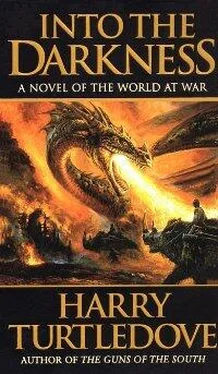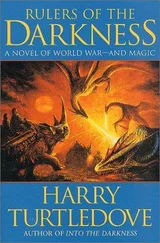Some few of the prisoners in Forthwegian uniform were tall, yellow-haired men, not short, swarthy ones. Pointing at them, a soldier in Leudast’s company exclaimed, “Powers below! How did the cursed Gyongyosians get over here to the other side of the kingdom to help the Forthwegians?”
“Those aren’t Gongs, Nantwin, you goose,” Leudast answered. “They’re just Kaunians. They’ve been here since dirt.”
“What’s a Kaunian?” Nantwin asked. He had a strong Grelzer accent, which meant he came from the far south of Unkerlant. No Kaunians in that part of the world, sure enough.
“They used to run a whole lot of the northeast,” Leudast said, “back before the Algarvians and Forthwegians smashed up their empire.”
“How come they look like Gongs?” Nantwin said.
“They don’t, really,” Leudast said. “Aye, they’re blond, but that’s about it.” The differences seemed obvious to him; there were Kaunians not far from his farming village. Not only were they tall and skinny, but their hair lay flat on their heads, where the Gyongyosians’ sprang out wildly in all directions. Kaunians’ hair ran to silver gilt, too, while that of the Gongs was a tawny yellow.
Such subtleties were lost on Nantwin, who said, “Curse them, they look like Gyongyosians to me.”
“Fine,” Leudast said. “They look like Gongs to you.” Life was too short for arguments over things that didn’t matter. “Inefficient,” he muttered.
A prisoner of Kaunian blood stared at him—through him. By the expression on the fellow’s face, Leudast looked like scum to him. Leudast laughed. The Kaunian jerked as if he’d stepped on a thorn. Leudast couldn’t have cared less about a worthless captive’s opinion of him.
“Why are you wasting your time gaping at these miserable bastards?” Sergeant Magnulf demanded. “Odds are King Swemmel will put ’em to work mining brimstone and quicksilver, and they’ll never come out from the holes again. They might as well be dead already. You get moving.”
“Sorry, Sergeant,” said Leudast, who knew he would be wasting his time if he tried to explain to Magnulf that he’d been trying to show Nantwin the Kaunians of Forthweg were different from Gyongyosians. Magnulf didn’t want explanations. Obedience was all he craved.
He grunted now, satisfied that he’d got it. “Come on,” he said. “We’ll be breaking into Eoforwic in another few days.” Leudast tramped after him. He would rather have been back on his farm. If he had to find himself in the middle of a war, though, he was just as well pleased to find himself in the middle of an easy one.
Colonel Sabrino ducked out of his tent. One of the tethered dragons at the temporary farm north of Gromheort flapped its wings and hissed at him. The Algarvian dragonflier stopped in his tracks, as if a human foe had insulted him. He sent the most obscene gesture he knew back at the dragon, which hissed again; it might have been insulted in turn. Laughing, Sabrino swaggered off toward the officers’ club.
That too was housed in a tent. The tapman bowed when Sabrino came inside. “How may I please you, my lord?” he asked.
“If you’d turn into a beautiful woman, that would give you a head start on the job, no doubt about it,” Sabrino answered. A couple of fliers from his wing who were sitting around with drinks in front of them laughed. So did the tapman, though he remained resolutely male and on the homely side. With a sigh, Sabrino said, “I suppose I’ll have to content myself with a glass of port. Put it on my scot.”
“Aye, my lord.” The tapman pulled cork from bottle and poured. Sabrino sipped. The fortified wine was not of the best, but it would have to do. Wartime meant sacrifice.
“Join us, Colonel, if you would,” Captain Domiziano said. He tapped the stool beside him. Senior Lieutenant Orosio, who shared the table with Domiziano, nodded to show the invitation came from him, too.
“Don’t mind if I do.” Sabrino perched on the stool and raised his glass. “Here’s to a splendid little war.”
“A splendid little war,” Domiziano and Orosio echoed. They drank with their commanding officer. Orosio said, “As near as I can see, sir, we’ve got Forthweg in a box with a pretty ribbon around it.”
“That’s how things look to me, too,” Sabrino said, nodding. “Pity we had to let them cross the border and do so much damage inside our kingdom, but we’ve paid them back and then some.”
“So we have,” Domiziano agreed. He had a bandage over one ear, which a Forthwegian beam had cooked. But he’d accounted for four Forthwegian dragons and torn up the enemy’s countryside; the small wound hardly seemed to upset him. He went on, “We’d have done the same even if the Unkerlanters hadn’t sneaked up behind King Penda and kicked him in the arse.”
“No doubt about it,” Sabrino repeated. “None at all. The Forthwegians are brave enough, but they haven’t got enough behemoths and they haven’t got enough dragons and they don’t quite know what to do with the ones they have got. We’d have needed another couple of weeks to overrun the whole kingdom, but we’d have done it, all right.”
Orosio scratched at the edge of his goatee. “Sir, what do we do if we meet Unkerlanter dragons in the air?”
“Pretend they don’t exist,” Sabrino said at once. “If the fliers blaze at you, evade. Not to put too fine a point on it, run away. King Mezentio does not want a war with Unkerlant. I’m told that’s going to be the subject of a general order in the next day or two. We have enough on our plate now without worrying about King Swemmel, too.”
“I don’t think the Unkerlanters are any great worry,” Domiziano said. “We taught them enough of a lesson in the Six Years’ War that Swemmel isn’t likely to want to tangle with us, either.”
“Here’s hoping,” Sabrino said, and drank to the hope. His junior officers drank with him.
An orderly stuck his head into the officers’ club. Spying Sabrino, he immediately looked relieved. “Ah, here you are, sir,” he said. “A message on the crystal just came in: your wing is ordered to join in the attack on the town of Wihtgara.” He pronounced the uncouth Forthwegian syllables as well as an Algarvian might be expected to do.
Sabrino drew a map from the vest pocket of his uniform tunic. He spread it out on the table so Domiziano and Orosio could study it, too. After a moment, Sabrino’s forefinger stabbed out. “About fifty miles northwest of here,” he said, and turned to the orderly once more. “Tell the crystallomancer to reply that we shall be flying within half an hour.” He knocked back the rest of his port—it wasn’t really good enough to linger over—and nodded to his companions. “Time to give the Forthwegians another dose, lads.”
As usual, Sabrino had to pick his way among the tethered dragons to keep from fouling his boots with their noxious droppings. As usual, his own mount had forgotten he’d been flying it for years. As usual, it hissed and flapped and spluttered, doing its best to keep him from climbing aboard. It did refrain from trying to flame him down; that was beaten into war dragons from hatchlinghood. For small favors, Sabrino gave thanks.
He gave thanks again when the dragon’s enormous batwings thundered behind him and the ground dropped away below. The view he got from on high was almost worth putting up with the stupidity and viciousness of dragons. The view of the rest of the dragons in his wing, bellies silvered, backs painted in red and white and green, was splendid, too.
“Come on,” he said, and tapped his dragon with the goad to bring its course farther north of west. “We can do it.”
The dragon, predictably, didn’t want to. As far as it was concerned, it was up in the sky to hunt. Sabrino’s purposes mattered little to it. It had been perfectly content to fly along in the direction it had chosen. When he tried to get it to change the small stubborn spot that passed for its mind, it twisted its head back along the length of its long, sinuous neck and did its best to pluck him off his perch with its teeth.
Читать дальше












